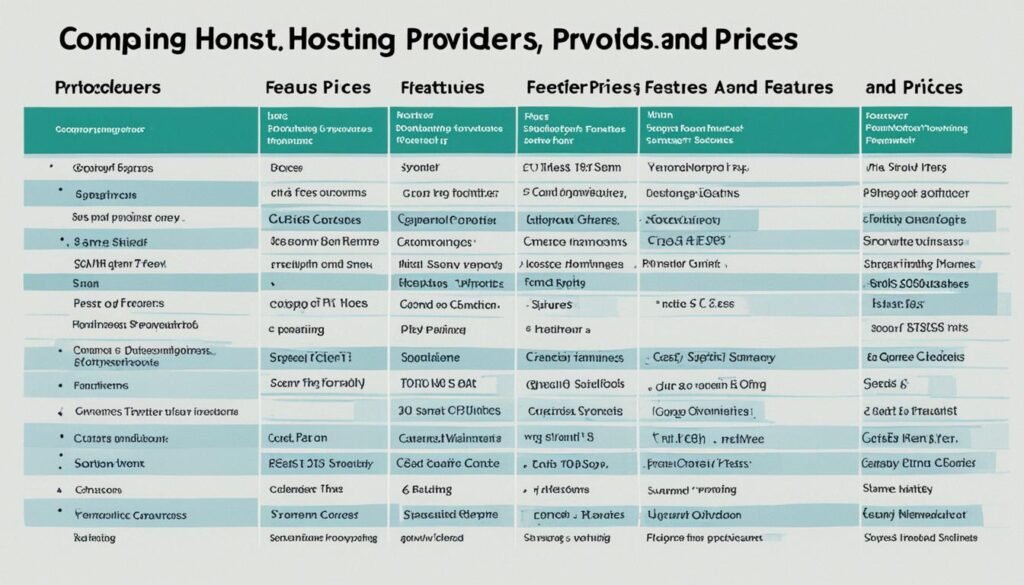Choosing the right hosting provider is crucial for the success of your blog. The hosting service you select will impact your blog’s performance, security, and reliability. Consider factors such as uptime, security features, customer support, and scalability when evaluating hosting providers. By making an informed decision, you can ensure that your blog has a reliable and secure web hosting solution.
Key Takeaways: Right Hosting Provider
- Choosing the right hosting provider is vital for your blog’s success.
- Evaluate factors like uptime, security features, customer support, and scalability.
- Make an informed decision to ensure a reliable and secure web hosting solution.
- Consider the impact of the hosting service on your blog’s performance and reliability.
- Thoroughly research and compare different hosting providers before making a selection.
Why Good Hosting is Important for Your Blog
Good hosting is essential for the success of your blog. Your hosting service plays a crucial role in website performance, uptime, and security. A reliable and secure web host ensures that your blog is accessible to visitors, offers fast loading speeds, and provides robust security measures to protect your data and the data of your visitors.
When choosing a hosting provider, it’s important to prioritize these factors to ensure a positive user experience for your blog visitors. Investing in good hosting can significantly impact your blog’s success by:
- Improving website performance: Good hosting ensures that your blog loads quickly, providing a smooth browsing experience for your visitors. Slow loading speeds can lead to higher bounce rates and loss of potential readers.
- Ensuring high uptime: A reliable hosting provider will guarantee a high uptime percentage, minimizing the chances of your blog being inaccessible to visitors. This is crucial for maintaining reader trust and credibility.
- Enhancing security measures: Good hosting services prioritize the protection of your blog and its data. They implement strong security measures, including firewalls, malware scanning, and regular backups, to safeguard your content and visitor information.
“A reliable and secure web host ensures that your blog is accessible to visitors, offers fast loading speeds, and provides robust security measures to protect your data and the data of your visitors.”
When you choose a good hosting provider, you can focus on creating and growing your blog without worrying about technical issues. A secure hosting environment allows you to focus on producing quality content and engaging with your audience.
Remember, a reliable web host is an investment in your blog’s future. By prioritizing good hosting, you set the foundation for success and ensure that your blog has a reliable, secure, and performant online presence.
Understanding Different Types of Web Hosting

When it comes to web hosting, there are various options available that cater to different needs and requirements. Understanding the differences between these hosting options can help you make an informed decision for your blog. Let’s explore the four main types of web hosting:
Shared Hosting
Shared hosting is a popular and cost-effective option for beginners or small-scale blogs. In this type of hosting, multiple websites share the same server resources, including CPU, RAM, and disk space. It is an affordable solution but may have limitations in terms of performance and scalability.
VPS Hosting
VPS (Virtual Private Server) hosting provides a more flexible and customizable environment. It involves partitioning a physical server into multiple virtual servers, each with its own dedicated resources. This type of hosting offers greater control and scalability compared to shared hosting.
Dedicated Hosting
If you require maximum control over your hosting environment and dedicated resources, dedicated hosting is the solution. With dedicated hosting, you have exclusive use of an entire server, ensuring optimal performance and customization options. This type of hosting is suitable for blogs with high traffic and resource-intensive applications.
Cloud Hosting
Cloud hosting utilizes a network of virtual servers to create a scalable and reliable hosting environment. This type of hosting offers exceptional flexibility and resource allocation. With cloud hosting, your blog is not reliant on a single physical server, reducing the risk of downtime and ensuring high availability.
| Type of Hosting | Description | Advantages |
|---|---|---|
| Shared Hosting | Multiple websites share server resources. | – Cost-effective option – Easy to set up and manage |
| VPS Hosting | Virtual servers with dedicated resources. | – Increased control and flexibility – Scalability options |
| Dedicated Hosting | Exclusive use of a physical server. | – Maximum control and customization – High performance |
| Cloud Hosting | Scalable and reliable hosting environment. | – Flexibility and resource allocation – High availability |
By understanding the different types of hosting options available, you can choose the one that best suits the needs of your blog. Consider factors such as budget, website traffic, scalability requirements, and desired level of control. Your hosting choice will significantly impact your blog’s performance, security, and overall user experience.
Factors to Consider When Choosing a Hosting Provider
When selecting a hosting provider for your blog, it’s important to consider several key factors to ensure you make the right choice. These factors include hosting features, security, SSL certificates, cost, backups, customer service, and reliability. By carefully evaluating these aspects, you can select a hosting provider that meets your blog’s specific needs and provides a solid foundation for its success.
Hosting Features
One of the first things to consider is the hosting provider’s features. Look for essential features such as ample storage space, sufficient bandwidth, and a user-friendly control panel. Ensure that the hosting plan aligns with your blog’s requirements and supports the platform on which your blog is built.
Security and SSL Certificates
Website security is crucial for keeping your blog safe from cyber threats. Choose a hosting provider that offers robust security measures such as firewalls, malware scanning, and regular security updates. Additionally, look for SSL certificates, which provide an encrypted connection between your blog and its visitors, ensuring data confidentiality.
Cost and Affordability
Consider the cost of the hosting plan and evaluate its affordability within your budget. Compare the prices of different hosting providers and ensure that the features and resources offered justify the cost. Pay attention to any renewal charges or additional fees that may apply.
Backups
Regular backups are essential for protecting your blog’s data. Choose a hosting provider that offers reliable backup solutions, ensuring that your blog’s content and files are safeguarded. Look for features such as automatic backups and the ability to restore your blog to a previous state if needed.
Customer Service
Good customer service is crucial for resolving any technical issues or concerns that may arise. Choose a hosting provider that offers responsive and knowledgeable customer support. Look for options such as 24/7 live chat, phone support, and a comprehensive knowledge base to ensure you have the necessary assistance when needed.
Reliability
Reliability is key when it comes to choosing a hosting provider. Evaluate the provider’s uptime guarantee, which represents the percentage of time your blog will be accessible to visitors. Look for a high uptime guarantee, ideally 99.9% or higher, to minimize any potential downtime that could affect your blog’s availability.
Considering these factors when choosing a hosting provider will help you make an informed decision that aligns with your blog’s needs. Take the time to research and compare different providers to ensure you select a reliable, secure, and cost-effective hosting solution.
Choosing the Right Hosting Service for Your Blog

When it comes to selecting a hosting service for your blog, it’s important to evaluate the offerings of various hosting providers. By conducting thorough research on different web hosting companies, you’ll be able to compare the services they provide and find the right fit for your blog’s unique needs.
One of the key considerations when choosing a hosting service is the availability of shared hosting plans. Shared hosting allows multiple websites to share the same server, making it an affordable option for bloggers who are just starting out or have limited budgets. It’s important to assess the features and resources offered in shared hosting plans to ensure they align with your blog’s requirements.
In addition to shared hosting, another popular hosting option to consider is managed WordPress hosting. This specialized hosting service is tailored specifically for WordPress websites, offering features and optimizations that enhance the performance and security of your blog. Managed WordPress hosting takes care of technical aspects such as updates, backups, and security, allowing you to focus on creating and managing your blog content.
To help you make an informed decision, it’s crucial to consider factors such as pricing, features, and customer reviews. Compare the pricing plans of different hosting providers to ensure they fit within your budget. Assess the features offered by each hosting service, such as storage space, bandwidth limits, and scalability options, to determine if they meet the unique requirements of your blog.
Furthermore, reading customer reviews and feedback can provide valuable insights into the quality of a hosting provider’s services. Take the time to explore customer reviews and ratings, considering both positive and negative experiences. This information can help you gauge the reliability, performance, and customer support provided by various hosting companies.
Ultimately, choosing the right hosting service for your blog is crucial for its long-term success. By evaluating different hosting providers, considering shared hosting plans and managed WordPress hosting options, and conducting thorough research, you can make an informed decision that aligns with your blog’s specific needs and requirements.
Image: Choosing the right hosting service is essential for the success of your blog.
| Factors to Consider | Shared Hosting Plans | Managed WordPress Hosting |
|---|---|---|
| Cost | Affordable | May be higher |
| Features | Limited resources | Optimized for WordPress |
| Performance | Dependent on resource sharing | Optimized for WordPress speed |
| Security | Basic security measures | Enhanced security features |
Evaluating Your Blog’s Specific Needs

When it comes to choosing the right hosting provider for your blog, it’s essential to consider your blog’s specific needs. By evaluating factors such as storage, bandwidth, traffic, customization, and scalability, you can make an informed decision that aligns with your blog’s requirements.
Storage
Take into account the amount of storage space your blog’s content will require. Consider the size of your blog posts, images, videos, and any additional files you may need to host. Ensuring that your hosting provider offers ample storage space will prevent any limitations or restrictions down the line.
Bandwidth
Consider the amount of bandwidth your blog will need to handle the expected traffic. Bandwidth determines the speed and efficiency at which your blog can serve content to visitors. If you anticipate high traffic volumes, it’s important to choose a hosting provider that can accommodate your bandwidth needs.
Traffic
Examine the expected traffic levels for your blog. If you anticipate a growing audience or plan to run marketing campaigns that could drive significant traffic, look for a hosting provider that can handle the increased demand without affecting the performance of your blog.
Customization
Consider the level of customization you require for your blog. Determine if you need the flexibility to modify the design, layout, or functionality to match your brand or specific requirements. Some hosting providers offer more customization options than others, so it’s important to find one that aligns with your creative vision.
Scalability
Anticipate the potential growth of your blog and evaluate the scalability options provided by hosting providers. Will they be able to handle increased storage, bandwidth, and traffic as your audience grows? Choosing a hosting provider that offers scalability ensures that your blog can expand seamlessly without interruptions or performance issues.
By carefully evaluating your blog’s specific needs in terms of storage, bandwidth, traffic, customization, and scalability, you can select a hosting provider that provides the necessary resources and flexibility to support your blog’s growth and success.
Comparing Different Hosting Providers

When it comes to choosing the right hosting provider for your blog, it’s essential to compare the available options. This comparison will help you find the provider that offers the best combination of pricing, features, scalability, customer support, and security features to meet your blog’s specific needs.
Start by looking at the pricing plans of different hosting providers and assess whether they align with your budget. Consider what features each provider offers at various price points to determine which ones provide the most value for your investment. Keep in mind that the cheapest option may not always be the best choice if it doesn’t offer the necessary features and support for your blog.
Scalability is another crucial factor to consider when comparing hosting providers. As your blog grows, you’ll need a provider that can accommodate the increased traffic and resource demands. Look for providers that offer scalable hosting solutions, such as flexible storage and bandwidth options, to ensure your blog can handle growth without experiencing performance issues.
Customer support is vital in case you encounter any issues or have questions about your hosting service. Evaluate the quality and availability of customer support provided by each hosting provider. Look for providers that offer multiple support channels, such as live chat, email, and phone support, as well as 24/7 availability to ensure prompt assistance when you need it.
Security should be a top priority when comparing hosting providers. Check whether the providers offer robust security features, such as SSL certificates for data encryption, regular backups to protect your blog’s content, and advanced security measures to defend against malware and cyber threats. A secure hosting environment is crucial for safeguarding your blog and the data of its visitors.
By comparing these factors – pricing, features, scalability, customer support, and security features – you can make an informed decision when selecting a hosting provider. Take the time to research and evaluate different providers to find the one that best aligns with your blog’s specific requirements and goals.
| Hosting Provider | Pricing | Features | Scalability | Customer Support | Security Features |
|---|---|---|---|---|---|
| Provider A | Starting at $X/month | Feature 1, Feature 2, Feature 3 | Flexible storage and bandwidth options | 24/7 live chat, email, and phone support | SSL certificates, regular backups, advanced security measures |
| Provider B | Starting at $Y/month | Feature 1, Feature 2, Feature 3 | Scalable storage and bandwidth options | 24/7 live chat and email support | SSL certificates, regular backups |
| Provider C | Starting at $Z/month | Feature 1, Feature 2 | Fixed storage and bandwidth options | Email and limited chat support | Basic SSL certificates, backups |
Checking Genuine Feedback and Reviews

Before finalizing your choice of a hosting provider, it is crucial to gather genuine feedback and reviews from customers. This will help you make an informed decision based on the experiences of others. Taking the time to read hosting reviews, explore customer feedback, and check online review sites can provide valuable insights into the quality and reliability of different hosting services.
When reviewing feedback and reviews, it is important to consider both positive and negative comments. Positive feedback can highlight the strengths and advantages of a hosting provider, while negative feedback can alert you to potential shortcomings or issues. By evaluating a variety of opinions, you can get a well-rounded perspective on a hosting service’s performance.
Additionally, pay attention to overall hosting ratings. Many online review sites aggregate customer ratings to give an overall score to different hosting providers. These ratings can act as a useful benchmark when comparing different options and determining which hosting services are highly regarded by customers.
By checking genuine feedback and reviews, you can gain valuable insights into the hosting experiences of others. This knowledge will enable you to make an informed decision and choose a hosting provider that aligns with your specific needs and requirements.
Benefits of Checking Genuine Feedback and Reviews:
- You gain insights into the experiences of other customers
- Positive feedback highlights strengths and advantages
- Negative feedback reveals potential shortcomings or issues
- Overall ratings provide a benchmark for comparison
- Helps you make an informed decision
Selecting the Best Hosting Provider for Your Blog

After conducting thorough research, it’s time to choose the best hosting provider for your blog. Your hosting provider plays a crucial role in determining the performance, reliability, and overall success of your website. To ensure you make an informed decision, consider the following factors:
- Reliable Performance: Look for a hosting provider that offers reliable performance to ensure your blog loads quickly and seamlessly for your visitors. A hosting provider with robust server infrastructure and optimized hosting environment can significantly improve your website’s speed and performance.
- High Uptime: Uptime is critical for your blog because it determines how often your website is accessible to visitors. Choose a hosting provider with a high uptime guarantee to minimize the risk of your blog experiencing frequent downtime, ensuring that your audience can access your content when they need it.
- Excellent Customer Support: Opt for a hosting provider that offers exceptional customer support. This includes 24/7 availability, a responsive support team, and multiple support channels. Reliable customer support ensures that you can get timely assistance whenever you encounter technical issues or have queries regarding your hosting service.
- Cost and Features: Consider the cost of the hosting plan alongside the features it offers. Compare the pricing of different hosting providers to find a balance between affordability and the specific features you need for your blog. Look for features such as ample storage, bandwidth, email accounts, and user-friendly control panels.
- Scalability: As your blog grows, you may need to accommodate increasing traffic and scaling your website’s resources. Choose a hosting provider that offers scalability options, such as the ability to upgrade your hosting plan or seamlessly handle increased traffic without affecting your website’s performance or user experience.
By taking into consideration these factors, you can select the best hosting provider that aligns with your blog’s needs, ensuring that your website has a reliable and secure foundation to thrive upon.
“Choosing the right hosting provider is like laying the groundwork for your blog’s success. A reliable hosting provider with excellent performance and support ensures that your blog is always up and running, offering a seamless experience to your visitors.”
– Expert Blogger
The Importance of Web Hosting for Blog Success

Web hosting plays a crucial role in the success of your blog. A reliable and secure hosting service ensures optimal performance, fast loading speeds, and robust security measures to protect your blog and its visitors. Choosing the right hosting provider is essential to provide a positive user experience, build trust with your audience, and enhance the overall success of your blog.
When it comes to blog success, performance is key. Slow loading speeds can frustrate visitors and lead to higher bounce rates. With a reliable web hosting provider, you can ensure that your blog loads quickly, keeping your audience engaged and increasing the chances of conversion. Fast-loading pages also have a positive impact on search engine rankings, contributing to improved visibility and organic traffic.
Security is another crucial aspect of web hosting. It is important to protect your blog and its content from malicious attacks and data breaches. A reputable hosting provider offers robust security measures such as firewalls, encryption, and regular backups to safeguard your blog’s data. By ensuring the security of your blog, you build trust with your visitors and protect their personal information.
Reliability is also vital for the success of your blog. Downtime can significantly impact user experience and result in lost opportunities. A reliable hosting provider guarantees minimal downtime, allowing your blog to be accessible to visitors at all times. This reliability instills confidence in your audience and demonstrates your commitment to a seamless user experience.
Quote from Hosting Expert:
“Choosing the right web hosting provider is essential for the success of your blog. It impacts your blog’s performance, security, and reliability, which in turn affects your audience’s experience and your ability to grow and monetize your blog effectively.” – John Smith, Hosting Expert
To illustrate the importance of web hosting for blog success, let’s compare two scenarios:
| Scenario 1: Poor Web Hosting | Scenario 2: Reliable Web Hosting | |
|---|---|---|
| Performance | Slow loading speeds, high bounce rates | Fast loading speeds, improved user experience |
| Security | Vulnerable to cyber attacks and data breaches | Robust security measures, protection of blog and visitor data |
| Reliability | Frequent downtime, loss of potential opportunities | Minimal downtime, enhanced credibility and user trust |
As you can see, choosing a reliable hosting provider makes a significant difference in the success of your blog. It ensures optimal performance, enhances security, and builds trust with your audience. By investing in quality web hosting, you set the foundation for a successful and thriving blog.
Factors to Consider When Choosing Web Hosting
Dedicated Hosting
Cloud Hosting
Conclusion
In conclusion, selecting the right hosting provider is vital for the success of your blog. When evaluating hosting options, consider factors such as performance, security, customer support, and affordability. Research and compare different hosting providers to make an informed decision that aligns with your blog’s specific needs.
By choosing the right hosting provider, you can ensure that your blog has a reliable and secure foundation. A hosting service that offers optimal performance will result in fast loading speeds, ensuring a positive user experience for your blog visitors.
Moreover, robust security measures provided by a reputable hosting provider will protect your blog and its visitors from potential threats. Having reliable customer support will help you address any issues promptly, minimizing downtime and ensuring the smooth operation of your blog.
Lastly, affordability is a key consideration, and finding a hosting provider that offers quality features at a reasonable cost is crucial. By taking the time to evaluate and compare different hosting providers, you can make an informed decision that sets your blog up for growth and success.
FAQs
What factors should I consider when choosing a web hosting provider?
A: When choosing a web hosting provider, consider factors such as uptime reliability, customer support, pricing, scalability, security features, and the type of hosting plans offered.
Q: How do I select the right web hosting plan for my website?
A: To select the right web hosting plan for your website, assess your website’s needs, such as traffic volume, storage requirements, and technical features like SSL certificates or email hosting. Compare hosting plans offered by different providers to find the one that best fits your requirements.
Q: What is the importance of choosing the best web hosting service for my blog?
A: Choosing the best web hosting service for your blog is crucial as it impacts your website’s performance, security, and scalability. A reliable hosting service ensures your blog is accessible to visitors with minimal downtime or technical issues.
Q: How do I determine the right web hosting provider for my specific needs?
A: To determine the right web hosting provider for your needs, evaluate your website requirements, budget, and technical expertise. Research different providers, read reviews, and consider factors like server locations, performance guarantees, and additional features offered.
Q: What are the different types of web hosting services available?
A: The different types of web hosting services include shared hosting, VPS (Virtual Private Server) hosting, dedicated hosting, cloud hosting, and managed WordPress hosting. Each type caters to different needs and offers varying levels of performance and control.
Q: How can I choose the best web hosting provider for my blog?
A: To choose the best web hosting provider for your blog, assess factors like customer reviews, uptime guarantees, server speed, security measures, and additional features like automatic backups or website builders. Select a provider that aligns with your blog’s requirements and growth potential.
Q: Why is selecting the right web hosting crucial for the success of my blog?
A: Selecting the right web hosting is crucial for the success of your blog because it impacts factors like website speed, user experience, search engine rankings, and overall reliability. A reliable hosting provider can help ensure your blog performs optimally and remains accessible to your audience.




